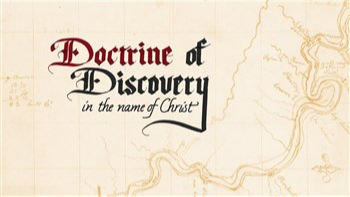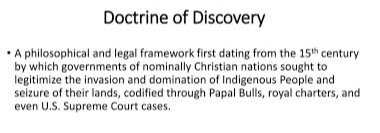
Vatican City, April 25 (RHC)-- In a historic shift long sought by Indigenous-led activists, the Holy See formally repudiated the Doctrine of Discovery, a dubious legal theory born from a series of 15th-century papal decrees used by colonizers including the United States to legally justify the genocidal conquest of non-Christian peoples and their land.
In a joint statement, the Vatican's departments of culture and education declared that "the church acknowledges that these papal bulls did not adequately reflectthe equal dignity and rights of Indigenous peoples" and "therefore repudiates those concepts that fail to recognize the inherent human rights of Indigenous peoples, including what has become known as the legal and political 'doctrine of discovery.'"
"The church is also aware that the contents of these documents were manipulated for political purposes by competing colonial powers in order to justify immoral acts against Indigenous peoples that were carried out, at times, without opposition from ecclesiastical authorities," the statement added. "It is only just to recognize these errors, acknowledge the terrible effects of the assimilation policies and the pain experienced by Indigenous peoples, and ask for pardon."
Indigenous leaders—who for decades demanded the Vatican rescind the discovery doctrine—welcomed the move, while expressing hope that it brings real change. "On the surface it sounds good, it looks good... but there has to be a fundamental change in attitudes, behavior, laws, and policies from that statement," Ernie Daniels, the former chief of Long Plain First Nation in Manitoba, Canada. "There's still a mentality out there—they want to assimilate, decimate, terminate, eradicate Indigenous people," added Daniels, who was part of a delegation that met with Pope Francis last year in Rome and Canada.
Ghislain Picard, an Innu leader and the regional chief of the Assembly of First Nations for Quebec and Labrador, told CBC that the Vatican's move is mostly symbolic. "The Vatican seems to be washing its hands of its role in the whole colonization of our lands, and to me it would be so simple to just accept the fact that they played a role," he said. "Reconciliation is a buzzword. But how it impacts current policy is really what's at stake here."
Discovery doctrine is rooted in a trio of papal decrees issued in the second half of the 15th century authorizing the Portuguese and Spanish monarchies to conquer land and enslave people in Africa and the Americas if they were non-Christians and dividing the Americas between the two burgeoning empires.
Nullified by the Vatican in the 16th century, the papal decrees nevertheless underpinned centuries of colonial conquest by Europeans and Euro-Americans. In 1823, United States Supreme Court Chief Justice John Marshall wrote in Johnson v. M'Intosh that Indigenous people could not sell land to whites because Indians' "power to dispose of the soil at their own will to whomsoever they pleased was denied by the original fundamental principle that discovery gave exclusive title to those who made it."
The precedent set by Johnson was cited as recently as 2005, when then-Justice Ruth Bader Ginsburg notoriously cited doctrine of discovery in Sherrill v. Oneida Indian Nation, an opinion decried by many Native Americans.

In a recent interview on Indian Country Today's newscast, Arizona State University law professor Robert Miller, who is Eastern Shawnee, said that "what the church did is an important worldwide educational moment, but it doesn't change the law in any country. It doesn't change titles to land anywhere." "It's gonna take far more than just the pope repudiating these 600-year-old papal bulls to make real changes for Indigenous peoples."

